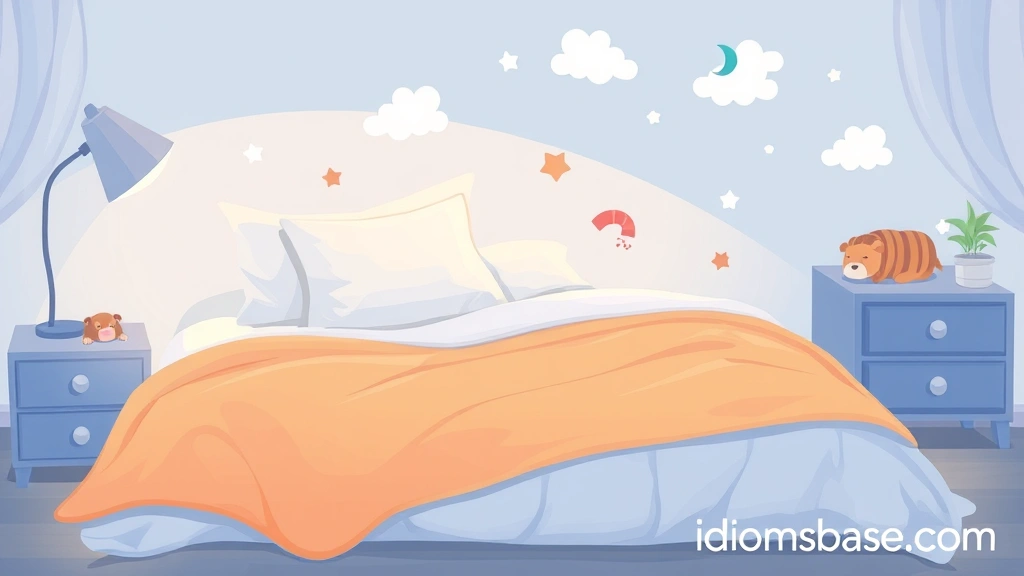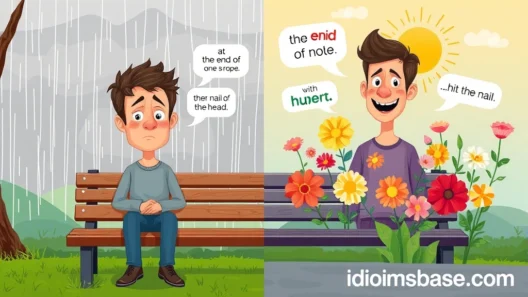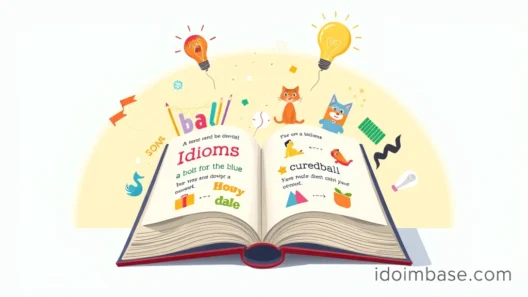Hey there, sleepyheads and night owls! Ever notice how much we talk about sleep, even when we're wide awake? It's true! Sleep is such a huge part of our lives, and it shows in the way we talk. English is packed with fantastic idioms that describe everything from being super tired to getting the best rest ever. These phrases add so much flavor to our conversations, and once you know them, you'll hear them everywhere!
Learning these idioms isn't just fun; it's a fantastic way to boost your English skills and understand native speakers better. So, are you ready to dive into the cozy world of sleep-related expressions? Let's explore 35 awesome idioms about sleeping that will make you sound like a pro!
35 Idioms About Sleeping You Need to Know
Here’s a fantastic collection of idioms that perfectly capture the essence of sleep, rest, and being tired. Get ready to add some linguistic sparkle to your conversations!
Idioms About Being Very Tired
These idioms perfectly describe that feeling when your eyelids are heavy, and all you want is your bed.
-
To be dead to the world: This means someone is sleeping very deeply and won't wake up easily.
- Example: "After working a double shift, he was dead to the world the moment his head hit the pillow."
-
To be out cold: Similar to "dead to the world," this implies a very deep sleep, often after being extremely tired or even knocked unconscious.
- Example: "The baby was out cold in her stroller after a long day at the park."
-
To crash out: This means to fall asleep very quickly because you're exhausted, often in an unplanned way.
- Example: "I was so tired after the hike, I just crashed out on the couch."
-
To hit the hay / To hit the sack: Both mean to go to bed or go to sleep. They're informal and friendly ways to say you're off to bed.
- Example: "It's getting late, I think I'm going to hit the hay."
- Example: "I've got an early start tomorrow, so I need to hit the sack."
-
To nod off: This describes falling asleep unintentionally, usually for a short period, often while sitting up.
- Example: "The lecture was so boring, I started to nod off in my chair."
-
To be half-asleep: When you're still partly asleep, not fully awake or alert.
- Example: "I was half-asleep when the alarm went off, so I barely remember hitting snooze."
-
To be bone tired / dog tired: These emphasize extreme exhaustion, feeling tired right down to your bones.
- Example: "After running the marathon, I was absolutely bone tired."
- Example: "He was dog tired after chasing the kids all day."
-
To be ready to drop: This means you are so tired you feel like you could fall asleep immediately, wherever you are.
- Example: "I've been on my feet all day; I'm ready to drop."
-
To be sleep-deprived: This is a more formal way to say you haven't had enough sleep.
- Example: "Students often become sleep-deprived during exam season."
Idioms About Waking Up or Being Awake
These idioms are all about shaking off sleep or staying alert.
-
To wake up on the wrong side of the bed: This means to wake up feeling grumpy or in a bad mood for no clear reason.
- Example: "He's been snapping at everyone all morning; he must have woken up on the wrong side of the bed."
-
To be wide awake: This means to be fully awake and alert, not at all sleepy.
- Example: "Even after a long flight, I was surprisingly wide awake when we landed."
-
To be bright-eyed and bushy-tailed: This describes someone who looks fresh, energetic, and enthusiastic, especially in the morning.
- Example: "She arrived at work bright-eyed and bushy-tailed, ready to tackle the day."
-
To shake a leg: An informal way to tell someone to hurry up and get moving, often used when someone is being slow to get ready.
- Example: "Come on, shake a leg! We're going to be late!"

-
To burn the midnight oil: This means to work or study late into the night.
- Example: "I had to burn the midnight oil to finish my report on time."
-
To pull an all-nighter: To stay awake all night, usually to study or work.
- Example: "We had to pull an all-nighter to get the project ready for the presentation."
Idioms About Sleeping Soundly
Ah, the joy of a truly good night's sleep! These idioms capture that feeling.
-
To sleep like a log: This means to sleep very deeply and soundly, without being disturbed.
- Example: "After that long journey, I slept like a log."
-
To sleep like a baby: Similar to "sleep like a log," this implies a very peaceful and uninterrupted sleep.
- Example: "The gentle rocking of the boat made me sleep like a baby."
-
To get some shut-eye: An informal way to say you're going to get some sleep.
- Example: "I need to get some shut-eye before my early morning meeting."
-
To catch some Z's: Another informal phrase meaning to get some sleep. The "Z's" refer to the cartoon symbol for sleeping.
- Example: "I'm going to try and catch some Z's on the train ride."
-
To be in a deep sleep: A straightforward way to describe a very sound sleep.
- Example: "The thunder didn't wake her; she was already in a deep sleep."
Idioms About Naps and Short Sleeps
Sometimes, a little power nap is all you need!

-
To take a cat nap: A very short, light sleep, like a cat might take.
- Example: "I'm just going to take a cat nap before dinner."
-
To doze off: To fall into a light sleep, often unintentionally.
- Example: "He dozed off in front of the TV during the movie."
-
To get forty winks: To have a short nap or a brief period of sleep.
- Example: "I'm going to try and get forty winks before my next shift."
Idioms About Sleeping Through Something
These idioms describe missing out because you were asleep.
-
To sleep through something: To remain asleep despite noise or events that would normally wake someone up.
- Example: "I was so tired, I slept through the entire storm last night."
-
To sleep in: To sleep later than usual, especially in the morning.
- Example: "It's Saturday, so I'm going to sleep in and enjoy my rest."
Figurative Idioms Related to Sleep
These idioms use sleep concepts to mean something else entirely.
-
To let sleeping dogs lie: This means to avoid bringing up old problems or conflicts that might cause trouble if disturbed.
- Example: "I know you're upset, but it's probably best to let sleeping dogs lie and not mention it again."
-
To put something to bed: This means to successfully complete or resolve something, often a problem or a project.
- Example: "We finally managed to put the budget issue to bed last week."

-
To sleep on it: To delay making a decision until the next day so you can think about it more carefully.
- Example: "I'm not sure what to do, so I'm going to sleep on it and decide in the morning."
-
To sleep with one eye open: To be very cautious and vigilant, even when resting, because you feel unsafe or wary.
- Example: "After the break-in, she felt like she had to sleep with one eye open."
-
To lose sleep over something: To worry so much about something that it prevents you from sleeping.
- Example: "Don't lose sleep over that mistake; it's already done and gone."
-
To be fast asleep: To be in a deep sleep, quickly achieved.
- Example: "The moment his head touched the pillow, he was fast asleep."
-
To sleep around: This is an informal and negative idiom meaning to have many sexual partners. Be careful with this one!
- Example: (Avoid using this in polite conversation, but understand its meaning if you hear it.)
-
To sleep on the job: To neglect one's duties or responsibilities, often by literally falling asleep at work, but more often figuratively.
- Example: "The security guard was reprimanded for sleeping on the job."
-
To get your beauty sleep: To get enough sleep to look and feel healthy and refreshed.
- Example: "I need to get my beauty sleep tonight if I want to look good for the wedding tomorrow."
-
To sleep through the alarm: To fail to wake up when an alarm goes off.
- Example: "I was so tired, I completely slept through the alarm and was late for work."
Frequently Asked Questions About Sleep Idioms
Got questions? We've got answers! Let's clear up some common curiosities about these fascinating sleep-related phrases.
What is an idiom, and why are they important?
An idiom is a phrase or expression where the meaning isn't obvious from the individual words. For example, "to hit the hay" doesn't literally mean to punch some hay! Idioms are super important because they make language richer, more expressive, and more natural. Learning them helps you understand native speakers and communicate more effectively, making you sound more fluent and confident.
How can I remember all these idioms?
That's a great question! Here are a few tips:
- Use them! The best way to remember is to try using them in your own conversations or writing.
- Context is key: Pay attention to how native speakers use them. This helps you understand the nuance.
- Group them: Like we did here, group idioms by theme (e.g., "very tired," "sleeping soundly").
- Create flashcards: Write the idiom on one side and its meaning (and an example sentence!) on the other.
- Draw pictures: For some, drawing a little mental image can help solidify the meaning. For "sleep like a log," imagine a person lying stiff like a log!
Are these idioms formal or informal?
Most of the idioms we've discussed, especially those directly about sleeping (like "hit the sack," "catch some Z's"), are quite informal. You'd use them with friends, family, or close colleagues. Some, like "sleep-deprived" or "burn the midnight oil," can fit into slightly more formal contexts, but many are definitely for casual chats. Always consider your audience and the situation!
Can I use these idioms in written English?
Absolutely! While many are conversational, they're perfectly fine in informal writing like emails to friends, personal blogs, or creative writing. For formal academic papers or business reports, you'd generally stick to more direct language, but for adding personality and flair, they're great!
Do other languages have similar sleep idioms?
Yes, many languages have their own unique and interesting idioms related to sleep! While they won't be word-for-word translations, the concept of expressing tiredness, deep sleep, or waking up in a bad mood is universal. It's fascinating to see how different cultures describe similar experiences!
Is "sleeping around" really an idiom about sleeping?
It is, but it's important to note its very specific and figurative meaning. Unlike the other idioms which literally relate to the act of sleeping or being tired, "sleeping around" has evolved to mean having multiple sexual partners, and it carries a negative connotation. It's good to know for comprehension, but use it with extreme caution, if at all, in your own speech.
Key Takeaways
Wow, we've covered a lot of ground, haven't we? From being "bone tired" to "sleeping like a log," the English language truly has a rich vocabulary for our nightly (and sometimes daily!) rest.
Here are the key takeaways from our journey through sleep idioms:
- Idioms add flavor: They make your English sound more natural, expressive, and engaging.
- Context is king: Always pay attention to how and when these idioms are used to understand their true meaning and appropriate usage.
- Practice makes perfect: The best way to master these phrases is to try using them yourself in conversations and writing. Don't be afraid to experiment!
- Not all "sleep" idioms are literal: Some, like "let sleeping dogs lie" or "put something to bed," use the concept of sleep to mean something entirely different.
- Be mindful of tone: Many sleep idioms are informal, perfect for casual chats but less so for formal settings.
So, the next time you're feeling "ready to drop" or you've "slept like a baby," you'll have the perfect idiom to describe it. Keep practicing, keep exploring, and you'll be sounding like a native speaker in no time. Sweet dreams and happy learning!





